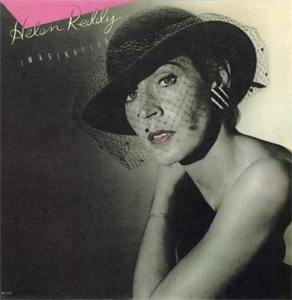
https://www.allmusic.com/album/imagination-mw0000839195
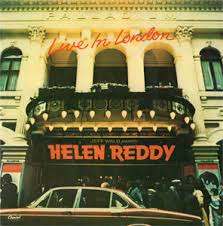
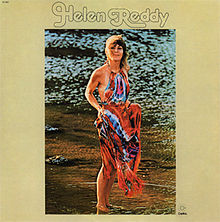
Helen Reddy’s second album contains two originals, as well as covers of material by John Lennon, Carole King and Toni Stern, Randy Newman, Donovan Leitch, Leon Russell, and Alex Harvey. Over the years Reddy would continue to cover material by Carole King, Leon Russell, and Harvey; both she and Bette Midler covering Harvey’s “Delta Dawn,” with Reddy getting the chart hit. Here her rendition of his “Tulsa Turnaround” is intriguing and gives a good indication of the direction her music would take. These are very personal readings of Paul Parrish’s”Time” and Leon Russell’s “I Don’t Remember My Childhood”; the accompaniment is laid-back and subdued, unlike Reddy’s Love Song for Jeffrey album. Producer Larry Marks has a haunting foundation for David Blue’s “Come on John,” and one wonders if like Mama Cass on “I Call Your Name” or Janis Joplin’s “Happy Birthday John Lennon,” Reddy isn’t singing this to the Beatle? Her rendition of Lennon’s solo tune, “How?,” is a rarity for the singer — and as sparse as the Plastic Ono Band, minus what backed her on the soundtrack to All This and World War II when she performed “Fool on the Hill.” The album Helen Reddy has a cover photo of the vocalist wearing a red and blue dress in ankle-deep water, a resting point before her cluster of Top 40 recordings. Donovan’s “New Year’s Resolution” and Carole King/Toni Stern’s “No Sad Songs” give the singer a platform to help craft her sound. It’s a nice glimpse of the naïve side of Reddy and a pleasant listening experience, though it was the only one of her early albums not to find representation on her Greatest Hits. Because there was no big hit on the record, it is not as well known as her other recordings, but it definitely has charm and is an essential part of her collection of music. https://www.allmusic.com/…/helen-reddy-capitol…
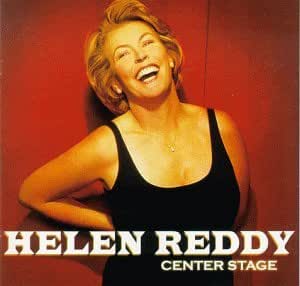
Center Stage is a masterful album from Helen Reddy, combining, as she says in the liner notes, “two areas of my career: the recording studio and the theatrical stage.” There are 14 selections, all from different shows, beginning with Cole Porter’s “Blow, Gabriel, Blow” from Anything Goes to “The Party’s Over” from Bells Are Ringing. The former, in particular, is culture shock for Reddy’s radio fan base. It is like nothing the fans of her hits are used to, and for Cole Porter’s legion of fans, it might be equally jolting. The voice so recognizable as an adult contemporary pop vehicle does what Reddy’s friend Petula Clark did on the soundtrack to Goodbye, Mr. Chips, an album composed by Leslie Bricusse and conducted by John Williams: it makes a transition. “I Still Believe in Love” is more of what the fans know and love. After all, it’s Marvin Hamlisch and Carole Bayer Sager penning the tune from They’re Playing Our Song. It’s followed by “A Boy Like You,” a Weil/Hughes composition from Street Scene, and both tracks two and three are her hit “You and Me Against the World”revisited, her emotive voice plucking the heartstrings. “Surrender” changes the pace; a five-piece vocal ensemble consisting of Peyce Byron, Sabrina Cowans, Michele Mais, Wayne Moore, and Brenda Silas Moore push the artist to heights she hasn’t sought on her hits. It’s one of the highlights of the disc, and a career moment in her vast repertoire. Richard Hillman duets with the singer on “You’re Just in Love” from Call Me Madam, and it is exquisite. Bruce Kimmel’s production is seamless, and this collection becomes more special as the listener goes deeper into the disc. Joseph Baker arranges and conducts “Tell Me It’s Not True,” a special performance here, as Reddy states in the liner notes, she has “sung it so many times on Broadway and in the West End.” “Tell Me It’s Not True” and “Speak Low” give the singer a new arena to play in; to those not familiar with the works from where this material was culled, the album works simply as a new Helen Reddy disc, but with a twist. Sade should be so classy decades after her initial fame.Steven Orich’s orchestrations are impeccable, as are the arrangements by Ron Abel. There was a hint of this when Reddy performed “The Fool on the Hill” for the 1976 soundtrack All This and World War II, but not on the scale she gives us 22 years later. Dusty Springfield tracked Where Am I Going, Olivia Newton-John gave us Warm and Tender, there’s the Linda Ronstadt/Nelson Riddle trilogy, and Petula Clark’s The Other Man’s Grass Is Always Greener (the album, not the title track), but where those albums were conscious efforts by the singers to move into a new direction, this is Helen Reddy giving the world the scene she is into — the theater. Dionne Warwick gave us hits from Bacharach & David’s Promises Promises, but Reddy chooses “Knowing When to Leave” from that Broadway musical. The song selection is tremendous, and the performance is a milestone for a singer who has already conquered other formats.Center Stage is a delightful treat and will be a considered a classic years down the road, on that you can be sure.
https://www.allmusic.com/album/center-stage-mw0000044015?fbclid=IwAR2-xDj2czcvsrZQczHCnDV4-j_JSNGi0ytb9h7l-iJyL6ObgJyKBqZ3Jq0
AllMusic Review by Joe Viglione [-]
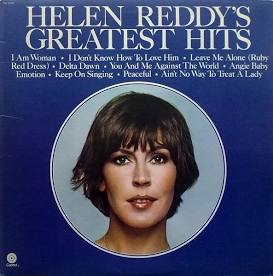
In 1987, Capitol re-released this ten-song disc on CD with five additional tracks, including Helen Reddy’s last three hit singles; this vinyl set contains the ten biggest tunes that built the singer’s legend. Just as George Martin remixed the songs by the group America that he did not originally produce for their “best of,” some of these productions feel like different mixes rather than the sound radio listeners were familiar with. It’s the same voice, and the same musicians; however, “I Am Woman” has more pronounced horns, bigger drums, and Reddy’s voice is clearer than on the original album. It certainly sounds like a superior mix, not what radio listeners were used to, unless the mastering job on this Greatest Hits release contains more defined mastering than the 45 rpm. There’s a special thanks to producer Joe Wissert, so it is very likely he expanded the sound of the Jay Senter recording from her second album; Larry Marks’ work from her debut, I Don’t Know How to Love Him; and possibly some of the Tom Catalano productions as well. Hearing these ten powerful hits together is a strong argument against Reddy’s detractors — she climbed the charts with about as many songs as her friend Petula Clark, and both were embraced by adult contemporary radio. Leon Russell’s “Bluebird” is absent, but the sublime Harriet Schock composition “Ain’t No Way to Treat a Lady” is here, the last of her singles from this era to go Top Ten, and second to last adult contemporary number one. It’s a brilliant tune, and striking performance. Francesco Scavullo did the photography, as he did for so many stars, from Janis Joplin to Barbara Streisand and Diana Ross. “You and Me Against the World” is moving and soulful, taking a Paul Williams composition and showing some of the heart Reddy would bring to her Center Stage disc many years later. The original vinyl ten-song version of Helen Reddy’s Greatest Hits is a concise package culled from six of her first seven albums. https://www.allmusic.com/album/helen-reddys-greatest-hits-mw0000453464
https://www.allmusic.com/album/helen-reddys-greatest-hits-mw0000453464
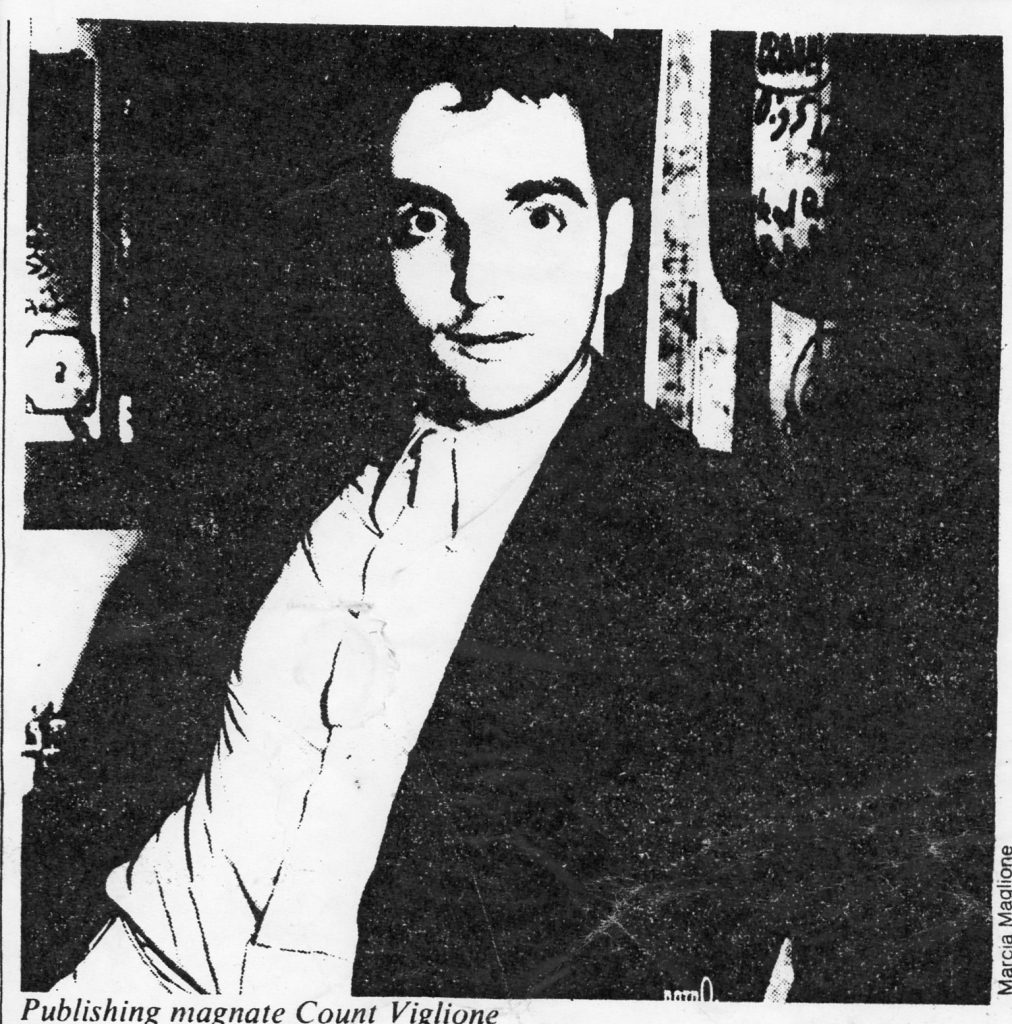
http://joevigtop40.blogspot.com/2015/12/december-2015-top-40.html
THANKS ERIC GRIGS FOR APPRECIATING MY WRITINGS: “Sure, I understand it’s a schmaltzy product, but it fits in beautifully alongside the earnest, breezy early 80s soft pop that was dominating radio at the time, so you have to greet it with that type of listening ear. Collaborator Joe Wissert provides lush production on it, pushing Australian-American Reddy to branch out in unexpected ways. Particularly, the title track: a floating synth dream that Joe Viglione of AllMusic remarked “might as well be the Go-Gos or Missing Persons; it’s a really great new wave pop tune, served up on a vinyl 12” with and extended dance remix for good measure.” We are talking about Helen Reddy, right? The same Reddy that People magazine disparagingly called the “1970s Queen of Housewife Rock?” Yes. If I had one critique of the song, the chorus needs a better hook—but the verses are mesmerizing. The music captures an etherial, dreamy quality that’s hard to get right. Suddenly, steel drums are dropped in that shouldn’t work at all, but somehow they fit brilliantly with the soft pulsating vibrations of the synthesized beats.
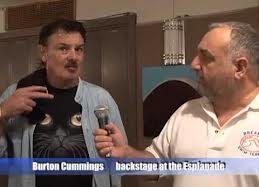
John Garabedian plays Helen Reddy’s exquisite rendition of Paul Wailliams’ “You and Me Against the World.” https://www.allmusic.com/…/helen-reddys-greatest-hits… My second favorite Reddy performance after “Ain’t No Way to Treat a Lady” written by my very dear friend Harriet Schock. When I gave Helen my New Changes album outside of her hotel in Boston she autographed an album for me. I wanted her to sign Harriet Schock’s Hollywood Town lp with “Ain’t No Way to Treat a Lady” but she said to me “Have Harriet sign it.” They were friends. I did Helen one better, in May of 1991 I met Harriet at a convention in Los Angeles and we became friends. I had covered “Love Song to Jeffrey” written by Helen on my New Changes disc and gave Helen the album. Little Richard was in my elevator, he lived atop the Hyatt where we were staying (as Paul Shaffer lives atop the Gramercy Park in NY, where we met him!) I asked Little Richard for his autograph, he said “I’ll see you here again” but I never did. Oh well, got to talk to him!!! It is now called the Andaz by Hyatt at 8401 Sunset Blvd. https://www.hyatt.com/andaz/laxss-andaz-west-hollywood My tribute to Helen is here: https://joeviglione.com/?p=1848 Dare I tell you, she played a drag queen/ s & m bar in Boston, The Haymarket on Washington St., doing Track, without her orchestra but singing to tracks of her records. There were six or seven drag queens dressed like Helen at the front of the stage handing her roses. Before she went into “I Am Woman” she said to the queens “I guess this is why y’all came.” It was a fantastic show.